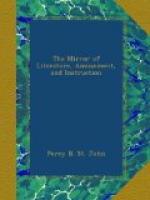Perish each record that might wake a thought
That would be treason to a faith like
this!—
Why should the spectres of past joys be brought
To fling their shadows o’er my present
bliss!
Yet,—ere we part for ever,—let
me pay
A last, fond tribute to the sainted dead:
Mourn o’er these wrecks of passion’s earlier
day,
With tears as wild as once I used to shed.
What gentle words are flashing on my eye!
What tender truths in every line I trace!
Confessions—penned with many a deep drawn
sigh.—
Hopes—like the dove—with
but one resting place!
How many a feeling, long—too long—represt,
Like autumn flowers, here opened out at
last!
How many a vision of the lonely breast
Its cherish’d radiance on these
leaves hath cast?
And ye, pale violets, whose sweet breath hath driven
Back on my soul the dreams I fain would
quell;
To whose faint perfume such wild power is given,
To call up visions—only loved
too well;—
Ye too must perish!—Wherefore now divide
Tributes of love—first offerings
of the heart;—
Gifts—that so long have slumbered side
by side;
Tokens of feeling—never meant
to part!
A long farewell:—sweet flowers, sad scrolls,
adieu!
Yes, ye shall be companions to the last:—
So perish all that would revive anew
The fruitless memories of the faded past!
But, lo! the flames are curling swiftly round
Each fairer vestige of my youthful years;
Page after page that searching blaze hath found,
Even whilst I strive to trace them through
my tears.
The Hindoo widow, in affection strong,
Dies by her lord, and keeps her faith
unbroken;
Thus perish all which to those wrecks belong,
The living memory—with the
lifeless token!
Barry Cornwall has contributed several minor pieces, though we fear his poetical reputation will not be increased by either of them.
Some of the minor pieces are gems in their way, and one of the most beautiful will be found appended to our current Number.
To the prose:—The first in the volume is “the Sisters,” a pathetic tale of about thirty pages, which a little of the fashionable affectation of some literary coxcombs might fine-draw over a brace of small octavos. As it stands, the story is gracefully, yet energetically told, and is entitled to the place it occupies. The author of Pelham (vide the newspapers) has a pleasant conceit in the shape of a whole-length of fashion, which, being the best and shortest in its line that we have met with, will serve to enliven our extracts:—




